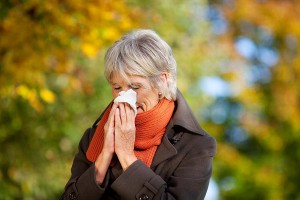By our Smarty friends at Charlotte Eye Ear Nose & Throat Associates, P.A.
While our children may find themselves with runny noses during allergy season, it’s important to remember our older parents might have runny noses, too. In fact, they might even be developing allergies.
What is causing those runny noses?
Typically, allergies tend to decrease in people as they get older because their immune systems naturally get weaker and no longer react to allergens. 
If they have a runny nose, what they likely have is a symptom of a condition called nonallergic rhinitis. This can be caused by things like weather changes, air quality, and strong smells. Runny noses can also be stimulated by eating. In fact, 90 percent of the men who see CEENTA ENT doctor Hunter Hoover, MD, complain about runny noses when eating.
“Runny noses in elderly patients are very common and usually not due to allergies,” Dr. Hoover said. “Fortunately, there are prescription nasal sprays available to help with that runny nose that do not have the side effects associated with many over-the-counter medicines.”
Could they have allergies?
That said, older people can sometimes develop new allergies, such as when they’re in a new environment with high levels of new allergens. Also, allergies in older adults can be under-diagnosed, since doctors often think the symptoms are minor issues and instead focus on other concerns like high blood pressure.
Should they visit a doctor?
If your parents have allergies, a doctor should help them determine the best course of treatment. This is because, while most allergy medicines are very safe for them, some medicines might aggravate existing medical problems or cause more serious ones. For example, some decongestants may increase blood pressure and cause insomnia, while others can be overly sedating.
More seriously, some allergy medicines like Benadryl are anticholinergic drugs, and some recent studies have suggested a link between these drugs and a greater risk of dementia or Alzheimer’s disease.
Also, as people get older, their bodies aren’t able to moisturize the lining of their noses, which can lead to more mucous and congestion. However, antihistamines can dry out nasal passages, which can make this problem worse. Instead, saline rinses and increased humidity can help thin out mucous.
What are some good options?
Immunotherapy – a system in which patients are given regularly-increasing doses to help the body build up a tolerance to those allergens – can also greatly reduce a patient’s allergy symptoms and provide long-term benefits.
In addition to medicine, avoidance is a good way to prevent some allergies. For example, washing sheets, using mattress covers, and cleaning air filters can reduce allergens in the home. Keeping windows shut during the heavier pollen season helps, too.
If you think your parents might have allergies, encourage them to visit one of CEENTA’s ENT doctors. Call 704-295-3000 for an appointment.
![]()
Charlotte Eye Ear Nose & Throat Associates




